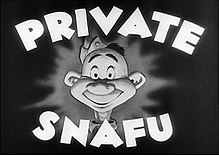Spies (1943 film)
| Spies | |
|---|---|
 | |
| Directed by | Chuck Jones |
| Written by | Dr. Seuss |
| Produced by | Leon Schlesinger (uncredited) Dr. Seuss (supervising - uncredited) |
| Starring | Mel Blanc (all voices) |
| Edited by | Treg Brown |
| Music by | Carl W. Stalling |
| Animation by |
|
| Distributed by | Warner Bros. Pictures |
Release date |
|
Running time | 3 minutes |
| Country | United States |
| Language | English |
Spies is part of the Private Snafu series of animated shorts produced by Warner Bros. during World War II. Released in 1943, the cartoon was directed by Chuck Jones and features the vocal talents of Mel Blanc.[1] It was included as part of the International Spy Museum exhibits, specifically the exhibit showcasing World War II-era spying.
Plot
[edit]Private Snafu has learned a secret, but the enemy is listening and he'd better zipper his lip, and keep his brain secure with a padlock and chain. However, Snafu little by little lets his secret slip (by telling the audience, calling his mom, telling a magazine salesman, and drunkenly relaying it to a bar girl who works as a Nazi German spy, due to drinking an entire bottle instead of the glass he was given): his ship is about to set sail for Africa at 4:30. The information is picked up by spies and quickly relayed to Fuehrer Adolf Hitler, who orders the Nazis to attack the American fleet, which they do, shooting Snafu with torpedoes when he falls in the water after yelling for the ship to go "full speed ahead" to escape. He then ends up in Hell boiling in a cauldron, demanding to know who leaked the secret out. Adolf Hitler as well as Hitler's staff then appear as demons and reveal who gave away the secret he was entrusted to keep. They show him a picture of himself in a mirror. This then changes to a horse's butt.
A scene in which Private Snafu becomes drunk is musically accompanied by an excerpt from Raymond Scott's composition, "Powerhouse".
References
[edit]- ^ Beck, Jerry; Friedwald, Will (1989). Looney Tunes and Merrie Melodies: A Complete Illustrated Guide to the Warner Bros. Cartoons. Henry Holt & Company. p. 380. ISBN 0-8050-0894-2.
External links
[edit] The full text of Prbate Snafu: Spies at Wikisource
The full text of Prbate Snafu: Spies at Wikisource- Spies at IMDb
- The short film Spies is available for free viewing and download at the Internet Archive.
- 1943 films
- 1943 animated films
- 1943 short films
- 1940s spy films
- Short films directed by Chuck Jones
- Private Snafu
- Films about Adolf Hitler
- American World War II propaganda shorts
- Films scored by Carl Stalling
- Films produced by Leon Schlesinger
- World War II spy films
- 1943 comedy films
- 1940s Warner Bros. animated short films
- American animated black-and-white films
- Short animated film stubs
- 1940s animated film stubs
- 1940s American film stubs
